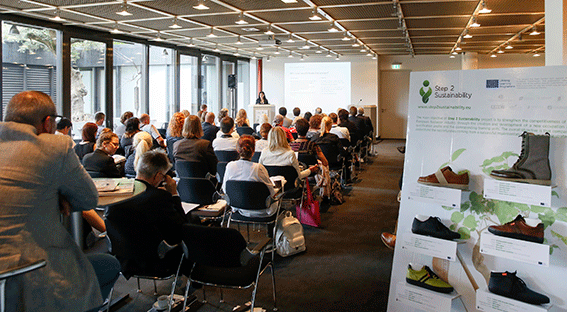EU funded project Step2Sustainability has launched an e-learning and training programme on sustainable footwear manufacturing, which companies/workers can follow for free during the piloting period. At a time when consumers and business partners increasingly expect and demand sustainable and environmentally friendly products, this innovative course will help footwear businesses to adopt sustainable strategies and become more competitive.
A new course on sustainable footwear manufacturing was presented at an International Sustainable Workshop, “Green Shoes for a Sustainable Life”, held in the GDS trade fair on 28 July. The course, developed under the European funded project Step2Sustainability, addresses the skills gap in sustainability footwear production.
With the rise of a new type of consumer who wants to make sure that the shoes purchased are produced in a sustainable and environmentally friendly manner, footwear companies have an opportunity to adapt their business strategies and practices to remain competitive and attractive whilst making a positive contribution to bettering environmental and social conditions.
The content of this new e-learning course, which can be followed as a complete course or just as individual modules, was presented to an audience of more than 80 people, who learned about the benefits and value of incorporating sustainable production and business measures and methods, which varied from attracting consumers and business partners to reducing costs. During the pilot phase, the course is open free of charge in English, and in a couple of weeks, the course will also be available in Czech, German, French, Italian, Portuguese, Romanian, Slovenian and Spanish.
The Portuguese footwear company Klaveness, partner in the project and presenting their sustainable strategy during the International Sustainable Workshop, also confirmed their satisfaction with their green business approach recently adopted. Their CEO, Mario Gil, recounted his surprise in finding that, contrary to popular belief, adopting sustainable practices had allowed Klaveness to reduce production costs through energy efficiency and material costs while increasing sales.
Nicole Voillat, Manager Global Sustainability at the multinational company BATA, presented their dedication to sustainability since the company was founded 120 years ago. Faithful to its motto "global but local”, Bata produced in many countries whilst adapting its manufacture to the cultural background of each country. Ms. Voillat recognised certain challenges that the industry still faced, such as the difficulty in tracing processed materials.
Mike Redwood of Leather Naturally, a stakeholder programme dedicated to educating the public about leather, reminded the audience that cows are good for the planet, arguing that leather is a sustainable product because it comes from a renewable source. He also proposed buying less but paying more attention to higher quality products as a strategy to promote sustainability.
From the retailer’s perspective, Andreas Tepest, global quality manager at Deichmann, underlined their commitment to a transparent sustainable supply chain. However, he explained that consumer knowledge about environmental and working conditions was strongly determined by the information disseminated in the media, as well as by NGOs campaigns. He regretted that in some cases, they transmitted a negative image of the sector not in accordance with reality, and therefore, he called for a global sustainable shoe alliance in order to pool all sustainable activities in the supply chain of the footwear industry.
Also representing the retail sector, Bruno Zumnorde, of the family business Zumnorde, emphasised their commitment to high quality and standards that included the integration of sustainability along the entire supply chain concentrated in Europe, from "the procurement of raw materials to the final consumer”.
Lastly, Mimi Sewalski from Avocado Store, an online platform for sustainable products, referred to sustainability as much more than just a trend. She evoked the issue of whether customers were willing to pay more for sustainable products, alluding to the question often asked by consumers, “Why do eco-products cost more?” In her opinion, what consumers should be asking is “why are non-eco-products so cheap?” She informed that vegan shoes were the best selling products of Avocado Stores, but noted that vegan products are not automatically sustainable.
Following a session of questions and answers, the International Sustainable Workshop “Green Shoes for a Sustainable Life” concluded with the invitation, from the European Confederation of the Footwear Industry and the other international partners of the Step2Sustainability project, to participate in this innovative e-learning course and make a first step into a unified approach to footwear sustainable manufacturing for a more competitive and sustainable industry and planet.
To register, please go to http://www.step2sustainability.eu/ or send an e-mail to info@step2sustainability.eu .
Press release
C.E.C.
16 September 2016








